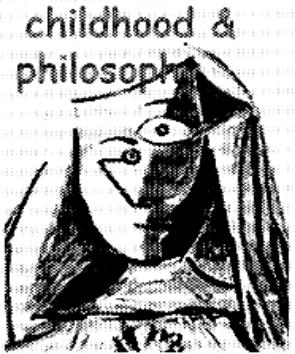improvising in the community of philosophical inquiry: a way to learn to inhabit uncertainty
DOI:
https://doi.org/10.12957/childphilo.2025.89428Palavras-chave:
incertezas, improvisação, comunidade de investigação filosófica, filosofia para crianças, performance coletivaResumo
Esta reflexão teórica propõe uma discussão aberta sobre a incerteza, tão presente nos debates sociais e educacionais contemporâneos, e sobre o valor que aprender a conviver com essas “incertezas” pode ter para o bem-estar de indivíduos e comunidades. Perceber diferentes alternativas antes de fazer uma escolha, sentir-se perdido diante da ambiguidade de certas informações e experimentar desorientação ao lidar com a complexidade são características dessa “incerteza” tão difícil de definir (Barreneche & Santi, 2022). A incerteza pode ser vista de forma negativa se provocar medo, preocupação, ansiedade ou sensação de vulnerabilidade (Hillen et al., 2017), ou pode ser encarada de maneira construtiva quando funciona como um impulso vital para a investigação (Tauritz, 2019). A Comunidade de Investigação Filosófica (CIF) – tal como concebida e promovida no currículo de Filosofia para Crianças (FpC) – torna-se um “ambiente seguro para a criatividade” (Weinstein, 2016), onde se aprende a habitar as incertezas. Uma CIF que improvisa (Zorzi & Santi, 2023), desenvolve e conscientiza atitudes diante da incerteza, aprendendo a enxergar alternativas como recursos, ambiguidades como horizontes criativos de significado e complexidade como uma experiência coletiva a ser vivida. Seis dimensões da improvisação – (1) respeito às diversidades; (2) confiança nas possibilidades; (3) construção de um senso de comunidade; (4) abertura às mudanças; (5) atitude exploratória; (6) paixão criativa, identificadas em pesquisas anteriores (Zorzi et al., 2019) – são propostas para orientar a formação de facilitadores e das próprias CIFs, dialogando com os “nove momentos recorrentes de desequilíbrio” sugeridos por Karin Murris (2008).
Downloads
Referências
Alterhaug, B. (2010). Improvisation as Phenomenon and Tool for Communication, Interactive Action and Learning. In M. Santi (Ed.). Improvisation between Technique and Spontaneity. Newcastle upon Tyne: Cambridge Scholars; pp. 103-133.
Babrow, A.S. (1992). Communication and Problematic Integration: Understanding Diverging Probability and Value, Ambiguity, Ambivalence, and Impossibility, Communication Theory, Volume 2, Issue 2, May 1992; pp. 95–130, https://doi.org/10.1111/j.1468-2885.1992.tb00031.x
Barreneche, M., Santi, M. (2022). Philosophy for Children: una pratica del (dis)orientamento in comunità di indagine. Studium Educationis; XXIII; pp. 160-170.
Barrett, F. (2013). Disordine armonico: leadership e jazz. Milano: EGEA.
Brashers, D.E. (2001). Communication and uncertainty management. Journal of Communication, 51, pp. 477-497.
Brookfield, S.D. (2006). The Skillfull Teacher. San Francisco: Jossey-Bass.
Felsman, P., Gunawardenac, S., Seifertc, C.M. (2020). Improv experience promotes divergent thinking, uncertainty tolerance, and affective well-being. Thinking Skills and Creativity, vol. 35, pp. 1-14.
Freire, P. (2014). Pedagogia dell’autonomia: saperi necessari per la pratica educativa. Torino: Gruppo Abele.
Gershenson, C. (2013). Facing Complexity: Prediction VS Adaptation. In A. Massip-Bonet, A. Bastardas-Boada (Eds.). Complexity Perspectives on Language, Communication and Society. Understanding Complex System. Berlin, Heidelberg: Springer; pp. 3-14.
Haynes, J. (2008). Children as Philosophers. Learning through Enquiry and Dialogue in the Primary School, 2nd edn. London, Routledge.
Hillen, M.A, Gutheil, C. M., Strout, T.D., Smets, E.M.A., Han, P.K.J. (2017). Tolerance of uncertainty: Conceptual analysis, integrative model, and implications for healthcare. Social Science & Medicine (180); pp. 62-75.
Kizel, A. (2021). The facilitator as self-liberator and enabler: ethical responsibility in communities of philosophical inquiry. Childhood & philosophy, n.17; pp.1–20.
Kohan, W. O. (2014). La filosofia come paradosso. Apprendere e insegnare a partire da Socrate. Roma: Aracne.
Mead, G.H. (1934). Mind, self & society: from the standpoint of a social behaviorist. Chicago, Ill: University of Chicago Press.
Murris, K. (2008). Philosophy with Children, the Stingray and the Educative Value of Disequilibrium. Journal of Philosophy of Education, Vol. 42, No. 3-4; pp. 667-685.
Pask G. (1975). Conversation, Cognition and Learning. London: Elsevier.
Peters, G. (2012). Certainty, Contingency, and Improvisation. Critical Studies in Improvisation, Vol. 8, n.2; pp. 1-8.
Santi, M. (2006). Ragionare con il discorso: il pensiero argomentativo nelle discussioni in classe. Napoli: Liguori.
Santi M. (2014). Epistemologia dell’inclusione? Un paradosso “speciale” per una sfida possibile. In L. D’Alonzo (Ed.). Ontologia Special Education. Lecce-Brescia: Pensa MultiMedia; pp. 13-32.
Santi, M. (2016). Education as Jazz: A Framework to Escape the Monologue of Teaching and Learning. In M. Santi, E. Zorzi (Eds.). Education as jazz. Interdisciplinary sketches on a new metaphor. Newcastle upon Tyne: Cambridge Scholars Publishing; pp. 3-27.
Santi, M., Zorzi, E. (2016) (Eds.). Education as jazz. Interdisciplinary sketches on a new metaphor. Newcastle upon Tyne: Cambridge Scholars Publishing.
Taleb, N. (2014). Il cigno nero. Come l’improbabile governa la nostra vita. Milano: Il Saggiatore.
Tauritz R. L. (2019). Certain you’re not sure? An inquiry into pedagogical strategies for teaching children how to manage uncertain knowledge about sustainability challenges. [Doctoral dissertation, Edinburgh].
Vygotskij, L. (1986). Thought and language. Cambridge, Massachusetts: The Massachusetts Institute of Technology press.
Weinstein J. (2016). A Safe Creativity Environment. In M. Santi, & E. Zorzi (Eds.), Education as Jazz: Interdisciplinary Sketches on a New Metaphors, pp. 49-61.
Wenger E. (2006). Comunità di pratica. Apprendimento, significato e identità. Milano: Raffaello Cortina.
Yang, J. (2014). Free improvisation and the Uncertainty Principle, In (eds.). F. Schroeder, M. O. Aodha, Soundweaving: Writing on Improvisation. Newcastle upon Tyne, Cambridge Scholars Publishing; pp. 79-94.
Zorzi, E., Camedda, D., Santi, M. (2019). Tra improvvisazione e inclusione: il profilo “polifonico” delle professionalità educative. Italian Journal of Special Education for Inclusion, v.7; pp. 91-100.
Zorzi, E., Santi, M. (2020). Improvising Inquiry in the Community: The Teacher’s profile. Childhood & Philosophy, vol. 16; pp.1-17.
Zorzi, E., Santi, M. (2023). How to generate (educate) an inquiring-jazzing community: free and open suggestions from an international workshop (ICPIC 2022). Childhood & philosophy, rio de janeiro, v. 19, abr. 2023, pp. 01- 22.



